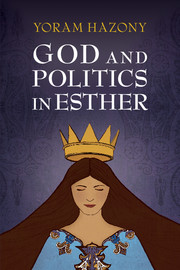Introduction
Published online by Cambridge University Press: 05 March 2016
Summary
Ever since the inclusion of the book of Esther in the biblical canon two thousand years ago, there have been those who have asked what place such a work can have in the Bible at all. Their question must be well taken, for at first glance Esther appears to be something very different from what we usually consider to be “biblical.” Esther is a tale of kings and queens and evil grand viziers that cannot help but strike one as a romance or a fairy story. Nowhere in its ten terse chapters can one find the cascading moral imperatives of Isaiah and Jeremiah, and even less in evidence are the sober laws of Moses. The term “God” appears nowhere, and one is hard-pressed to find any trace of theology amid the hairpin turns of the tale. Moreover, the Jewish heroes of the story seem to display little piety and negligible concern for Jewish law: Mordechai the Jew guides and advises his cousin, Hadasa, as she hides her heritage, marries a non-Jewish potentate, and, in a realm apparently rife with anti-Semitism, presumably gives up on any aspect of Jewish observance that would betray her past so that she may remain in the royal palace. The book even refers to the young Jewish heroine by the Persian name of Esther, meaning “star” – and the stars were themselves part of the cult of idolatry in Persia – a fact that cannot but suggest assimilation and capitulation to the surrounding civilization.
Yet for all this, when the rabbis of the Talmudic period looked back across Jewish history, seeking to grant it coherence and permanence by assembling its teachings into a canon, they ascribed great significance to Esther as a work concerned with themes relevant to the conclusion of the Bible. Indeed, when the rabbis spoke of the giving of the tora to the Jewish people, they argued that it had been accepted not once but twice: Once at Sinai at the beginning of the Bible, and then again at the end, in the time of Esther. And when they considered the eternity of the Bible's teachings, they asserted that there were two portions of Scripture that could never be abolished, the books of Moses and the book of Esther.
- Type
- Chapter
- Information
- God and Politics in Esther , pp. 1 - 4Publisher: Cambridge University PressPrint publication year: 2015



